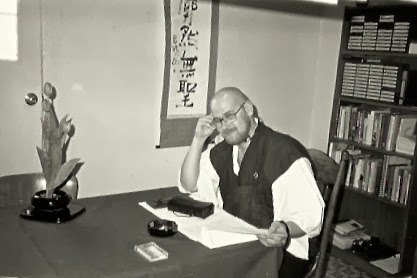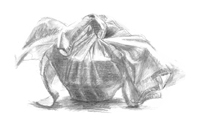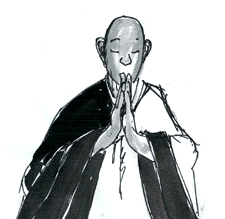
Rahula as one of the 18 Chinese Lohan

Rahula as one of the 18 Chinese Lohan
eMirror Vol 26, No. 47
Friday, November 18th, 2022
Edited by the Practice Council
The White Wind Zen Community:
An international community practising and teaching Dogen’s Zen since 1985.
[The Roshi continues reading his translation of “Big Advice to Rahula,” or the Maha Rahulovada Sutta from the book The Thread of Practice.]
“Practise like the earth, Rahula. If you become like the earth then the sensations which arise, whether pleasant or unpleasant, do not take hold of the mind, nor do they establish themselves. People may pour clean things onto the earth, or dirty things such as feces, urine, saliva, pus, blood, but the earth is not hurt, nor is it angered or moved to disgust. So too, if you practise like the earth, Rahula, then sensations which arise, whether pleasant or unpleasant, cannot take hold of the mind, nor will they establish themselves.
“Practise like water, Rahula. If you become like water then the sensations which arise, whether pleasant or unpleasant, do not take hold of the mind, nor do they establish themselves. People may wash clean things with water or dirty things such as pus and so on, but the water is not hurt, nor is it angered or moved to disgust. So too, if you practise like water, Rahula, then sensations which arise, whether pleasant or unpleasant, cannot take hold of the mind, nor will they establish themselves.
“Practise like fire, Rahula. If you become like fire then the sensations which arise, whether pleasant or unpleasant, do not take hold of the mind, nor do they establish themselves. People may burn clean things with fire or dirty things such as feces and so on, but the fire is not hurt nor is it angered or moved to disgust. So too, if you practise like fire, Rahula, then sensations which arise, whether pleasant or unpleasant, cannot take hold of the mind, nor will they establish themselves.
“Practise like air, Rahula. If you become like air then the sensations which arise, whether pleasant or unpleasant, do not take hold of the mind, nor do they establish themselves. Just as the air moves over clean things or dirty things such as feces and so on, but the air is not hurt, nor is it angered or moved to disgust. So too, if you practise like air, Rahula, then sensations which arise, whether pleasant or unpleasant, cannot take hold of the mind, nor will they establish themselves.
“Practise like space, Rahula. If you become like space then the sensations which arise, whether pleasant or unpleasant, do not take hold of the mind, nor do they establish themselves. Just as space abides nowhere so too, if you practise like space, Rahula, then sensations which arise, whether pleasant or unpleasant, cannot take hold of the mind, nor will they establish themselves.
-Ven Anzan Hoshin roshi, continuing teisho One: "Flowers Falling" in the series "Flowers and Worms", Hanamatsuri sesshin, April 11th to 14th, 1991, Zazen-ji.
Fusatsu: November 23rd, December 7th and 21st.
Introduction to Zen Workshop Ottawa
The next Introduction to Zen Workshop will take place on Saturday, December 10th, at 1:45 p.m. To register for the next workshop: https://IntroductionToZenWorkshop.eventbrite.ca
For more information please see:
Introduction to Zen Workshop (Ottawa)
For information concerning our Long-distance Training Program (for students living an hour or more commuting distance from the monastery in Ottawa), please visit this Web Page: Long Distance Training Program | White Wind Zen Community
Rohatsu O-sesshin
The seven-day Rohatsu O-sesshin begins at 8:00 p.m. on Thursday, December 1st and ends on December 8th, following Jodo-e (commemorating the Buddha's Awakening).
A Note to Preliminary and Public Students Concerning O-sesshin
During an O-sesshin the schedule is such that there is no time to meet face to face with preliminary students or to reply to email correspondence sent by public students. Public students are asked to send their weekly practice journals, as they will be reviewed. But unless there is something that needs an immediate reply, you will not receive an email reply until the week following the O-sesshin.
Jodo-e: December 8th.
Dainen-ki
December 12th is the anniversary of the day on which the Roshi’s Teacher, Ven. Yasuda Joshu Dainen roshi died.
Joya (New Year’s Celebration)
On Saturday, December 31st at 10 p.m. until Sunday, January 1st at 12:00 a.m., we will celebrate Joya or New Year with 108 recitations of the Mahaprajnaparamita Hridaya sutra mantra at midnight.
Hermitage:
The Roshi is continuing an extended period of "self-isolation" due to underlying health issues until the COVID-19 situation clarifies.
Teisho presented by Ven. Anzan Hoshin roshi at Zazen-ji, on March 21st, 1991: https://wwzc.org/dharma-text/river-memory
Rev. Chiso anagarika sat her weekly semi-retreat on Tuesday, November 15th at her home in the Berkshires. Tracey Parker sat a partial retreat on Saturday, November 12th at her home in Perth, Ontario. Aaron Ford sat a two-day retreat on Saturday, November 12th and Sunday, November 13th at his home in Calgary, Alberta.
If you would like to sit a retreat at Dainen-ji, please email schedule@wwzc.org to register a week in advance. For further information please visit this page: https://wwzc.org/retreats
If you would like to sit a retreat at home please follow the schedule outlined in this page:
https://wwzc.org/retreat-schedule-public-students. After your retreat, please send an email to schedule@wwzc.org to confirm that you sat a retreat and include the duration and location.
Saturday, November 19th to Saturday, November 26th
Saturday, November 19th: "Paramita" by Ven. Anzan Hoshin roshi: "Ksanti: Flexibility" (4 of 7, 22 minutes)
Sunday, November 20th: SAkN "The Anatomy of Awakening" by Ven. Anzan Hoshin roshi: "Strategies of Transcendence" (teisho 8 of 9)
Monday, November 21st: “The Touchstone" by Ven. Jinmyo Renge sensei: "The Touchstone 2, Countless" (Dharma Talk 2 of 22, 20 minutes)
Thursday, November 24th: “The Touchstone" by Ven. Jinmyo Renge sensei: "The Touchstone 2, Countless" (Dharma Talk 2 of 22, 20 minutes)
Saturday, November 26th: "Paramita" by Ven. Anzan Hoshin roshi: "Virya: Exertion" (5 of 7, 18 minutes)
Associate and general students should continue to follow the recorded Teachings schedule for the sitting you were attending at the monastery, and listen to that during your home practice.
You can access the online Recorded Teachings Library at wwzc.org/recorded-teachings-schedule.
You can also use the streaming site at app.wwzc.org to live stream recordings from the online Library. If you have forgotten your password or need assistance with accessing the recorded Teachings, please email schedule@wwzc.org.
Please note that teisho should be listened to in the correct order and with none missed out as themes, metaphors, questions raised and answered evolve in spirals throughout the series.
While most of the online Recorded Teachings library is password-protected and only accessible to students of the Lineage of Zen Master Anzan Hoshin, a small selection of MP3 recordings of teisho are accessible to the public at wwzc.org/recorded-teachings Additional recordings will be uploaded periodically. MP3 recordings of four recorded teisho by Ven. Anzan Hoshin roshi are currently available:
Dharma Position https://wwzc.org/dharma-position
Eyes See, Ears Hear https://wwzc.org/eyes-see-ears-hear
Embarrassment https://wwzc.org/embarrassment
Ven. Anzan Hoshin roshi's reading of his translation of Eihei Dogen zenji's “Bendowa: A Talk on Exerting the Way”: https://wwzc.org/bendowa-talk-exerting-way

Photograph of Ven. Anzan Hoshin roshi at Daijozan, mid-1980s,
by Ven. Shikai Zuiko sensei
Ven. Anzan Hoshin roshi has recently completed translation work on some shorter texts by Eihei Dogen zenji from the Shobogenzo. The work on these particular texts is based upon the literal translations that he worked on with Joshu Dainen roshi at Hakukaze-ji around 1977-78 followed by many years of putting them down, picking them up, and polishing. Naturally, more essential texts such as Uji, Genjokoan, Shinjin Gakudo and some 40 others were completed first and have been given extensive commentaries by the Roshi. This batch of texts includes Baike: Plum Blossoms, Ryugin: Howling Dragon, and Udonge: The Udumbara Blossoming and many others are nearing completion. Annotation details and successfully conveying them across various document formats are the issue at this point.
Work on Bussho: Buddha Nature, a very long and nuanced text by Dogen zenji, is ongoing.
Roshi is also finishing an update to the Saijo Shingi: The Deportment of Radiance, our manual of monastic training standards which is a supplement to the ancient Eihei Shingi and Keizan Shingi.
Begun by Ven. Shikai Zuiko o-sensei
Finished by Rev. Fushin Comeau shramon following her death

Three Jewels; Triratna (S); Sambo (J): Buddha, Dharma, and Sangha; Awareness, what arises within Awareness, the seamlessness of these two.
Posted November 18th, 2022. New entries are posted every two weeks.

Dogen zenji taught in the Tenzo kyokun: Instructions for the Tenzo (https://wwzc.org/dharma-text/tenzo-kyokun-instructions-tenzo) that the work of preparing and serving meals is "a matter for realized monks who have the mind of the Way “, or by senior disciples who have roused the Way-seeking mind." In alignment with this, part of Zen Master Anzan Hoshin's samu for the Community involves personally overseeing the activities of the ancient Office of Tenzo. Ven. Jinmyo Renge sensei serves as Tenzo and Mishin godo and Saigyo ino offer assistance as tenzo-anja.
The following meals were prepared during the November two-day sesshin:
Saturday
Breakfast: Chirashe sushi (calrose short-grain white rice, chopped cucumber, scallions, pickled daikon and pickled ginger with some of the liquid from the pickled ginger to sweeten the rice, mixed with chopped omelette made with wasabi).
Lunch: short-grain brown rice with sesame oil and chopped scallions; miso shiru (kombu, shoyu, rice vinegar, miso, sliced shitake mushrooms and their soaking liquid, baby bok choy and silken tofu); very thinly sliced red daikon (a gift from Shigemi Ichino) with lime juice, a tiny bit of mirin and salt.
Supper: brown and white basmati rice; miso-carrot soup (garlic, ginger, chopped carrots, apple, leeks, tomato, cumin, cayenne, sweet paprika, turmeric, coconut cream); red lentil dal ((red lentils, finely chopped onion, finely diced sweet potato, minced ginger, garlic and bird chilies, chopped fresh tomatoes, chopped fresh cilantro, garam masala, ground coriander, turmeric and cumin); Napa cabbage salad (thinly cut Napa cabbage, tomato spears, thinly cut carrots and red onion, dressing made from mayonnaise, lime pickle and a little mango chutney to sweeten it.
Sunday
Breakfast: Noodles (spaghettini, thinly sliced Spanish onion, poblano peppers and red bell peppers, tossed in a sauce made from reduced sodium shoyu, minced garlic, sambal oelek, vegetarian oyster sauce, ginger and sesame oil); scrambled eggs.
Lunch: brown and white Thai jasmine rice with sauteed daikon topping and roasted peanuts; seaweed soup (strained miso shiru from the day before, shoyu, wakame, chili oil and sesame oil, with silken tofu); baechu kimchi.
The following meals were prepared on Monday, Tuesday and Thursday evenings:
Monday Yakuseki:
Thai white and brown rice with sauteed onions, red bell peppers and cubed sweet potatoes, seasoned with chipotle adobo and ground cumin; frittata (caramelised onions, eggs, lots of black pepper, topped with sliced tomatoes and grated Friulano cheese; baechu kimchi.
Tuesday Yakuseki:
Thai white and brown rice; soup made from mushroom stock, vegetable stock, slivered ginger, shoyu, Xaoshing, with chopped gai lan and bok choy.
Vegetarian option: deep fried tofu (batter made from all purpose flour, rice flour, corn starch, grated garlic, chopped scallions, and ground coriander). Vegetarian spring rolls.
For those who wished to supplement their diet with meat: ‘chicken balls’ (pieces of chicken breast in a batter made from all purpose flour, rice flour, corn starch, grated garlic, chopped scallions, and ground coriander. Vegetarian spring rolls.
The tofu, chicken and spring rolls were served with two dipping sauces: A savoury dipping sauce made from Kecap manis (Indonesian sweet soy sauce) mixed with rice vinegar, shoyu, minced garlic, minced Thai red chilis. A sweet dipping sauce: cup soy sauce, sugar, salt, ground ginger, garlic powder, paprika, onion powder, white pepper, orange extract.
Thursday Yakuseki:
Cavatappi pasta with a garlic-butter sauce (butter, bran oil, minced garlic, chopped white onion, lime juice, chilli flakes, Parmesan cheese); chopped spinach with red kidney beans and strips of sauteed Spanish onions; large portobello mushrooms roasted with a spoonful of salsa and grated extra-old cheddar cheese.

If you would like to thank someone for a contribution they have made, please feel free to send an email to Jinmyo sensei at rengezo@gmail dot com, but be sure to type "eMirror” in the subject line.
From Jinmyo sensei:
Thank you to the Roshi for the gift of a Fudo Myo-o scroll and to Saigyo ino for hanging it in the Sensei-ryo.
|